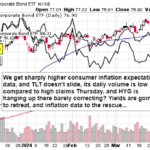![]() Stock photo by Vecteezy“Investors and consumers balk at costs of replacing fossil fuels with renewable energy, highlighting painful economics of climate mitigation,” says Greg Ip at the Wall Street Journal.
Stock photo by Vecteezy“Investors and consumers balk at costs of replacing fossil fuels with renewable energy, highlighting painful economics of climate mitigation,” says Greg Ip at the Wall Street Journal. Who Wants to Pay for the Green Transition?Greg Ip, one of my favorite columnists on the Wall Street Journal explains Why No One Wants to Pay for the Green Transition
Who Wants to Pay for the Green Transition?Greg Ip, one of my favorite columnists on the Wall Street Journal explains Why No One Wants to Pay for the Green Transition
In the past few years, Washington and Wall Street started fantasizing that the transition to net-zero carbon emissions could be an economic bonanza. “When I think climate change, I think jobs,” President Biden said. When Wall Street heard green energy, it saw profits. As Ford Motor launched an electric Mustang and pickup truck, its market value topped $100 billion for the first time.
This year the fantasy ended. With electric vehicle demand falling short of expectations, manufacturers are dialing back production and buying back stock instead. Offshore wind developers have canceled projects. The S&P Global Clean Energy Index has fallen 30% this year. Ford’s market cap is down to $42 billion.
This doesn’t mean the transition to net zero is over. Officials meeting this week at the United Nations climate conference are just as worried about climate change. Renewable energy continues to expand. In the very long run, it is still the case that economic welfare will be higher with less global warming.
But the economics of getting to net zero remain, fundamentally, dismal: Someone has to pay for it, and shareholders and consumers decided this year it wouldn’t be them.
Technological transformations are positive supply shocks: a new, more efficient technology comes along, and investment naturally gravitates toward this new technology because it is profitable.
By contrast, the green transition is driven by public policy. It is “a negative supply shock, with an accompanying need to finance investments whose profitability cannot be taken for granted,” French economist Jean Pisani-Ferry wrote in a report commissioned by the French prime minister and released in English in November. “By putting a price—financial or implicit—on a free resource (the climate), the transition increases production costs, with no guarantee that the reduction in energy costs will eventually offset them, while the investments it calls for do not increase productive capacity but must nevertheless be financed.”
Two Paragraph SummaryWe already have an infrastructure that efficiently delivers energy. There are natural gas pipelines, gasoline refineries, and gas stations.Green energy proponents want to not only trash something that is working and replace it with something new, the new idea will overload the existing power grid.People understand this adds to costs, despite idiotic claims by politicians stating otherwise.Fantasy BeliefsAnd to top it off, people see all the hype over the world ending, and those claims are increasingly understood as hype by anyone with any bit of common sense.The $100+ trillion price tags have people concerned.EVs Coming AnywayFor many people who don’t drive far and have access to a fast charger in their house, EVs make sense. The move to EVs will happen over time, assuming the cost of batteries does not go out of sight.My one disagreement with Ip is his comment “This doesn’t mean the transition to net zero is over.”His comment may even be correct, but what is the timeline? I see no chance by 2050.ESG Advocates Want to Amend the Constitution to Address Climate ChangeESG advocates may be in agreement with my comment because it has them proposing crazy ideas to get there.In case you missed it, please see ESG Advocates Want to Amend the Constitution to Address Climate ChangeThere is no risk of a constitutional change. But the threat is not moot.Understanding the RiskThere were over 20 contributors to the proposed economic and constitutional madness.I hate giving this the time of day because there is literally zero chance the constitution will be amended to address climate change.However, it is not beyond the scope of imagination for a president to declare an emergency and seek special powers to deal with it, with Congress’s approval. Some call for President Biden to do that now.More By This Author:Real Income Jumps 0.3 Percent Thanks To No Reported InflationHoot Of The Day: Biden Creates A New Economic Council On Supply Chains Let’s Discuss The Claim Home Prices Fell 17.6 Percent In the Last Year













